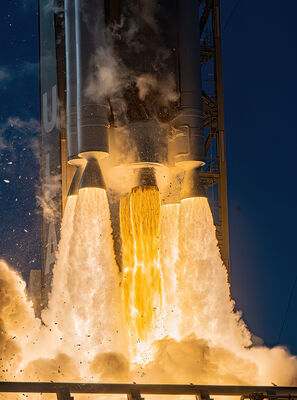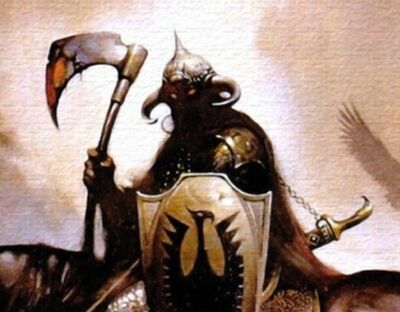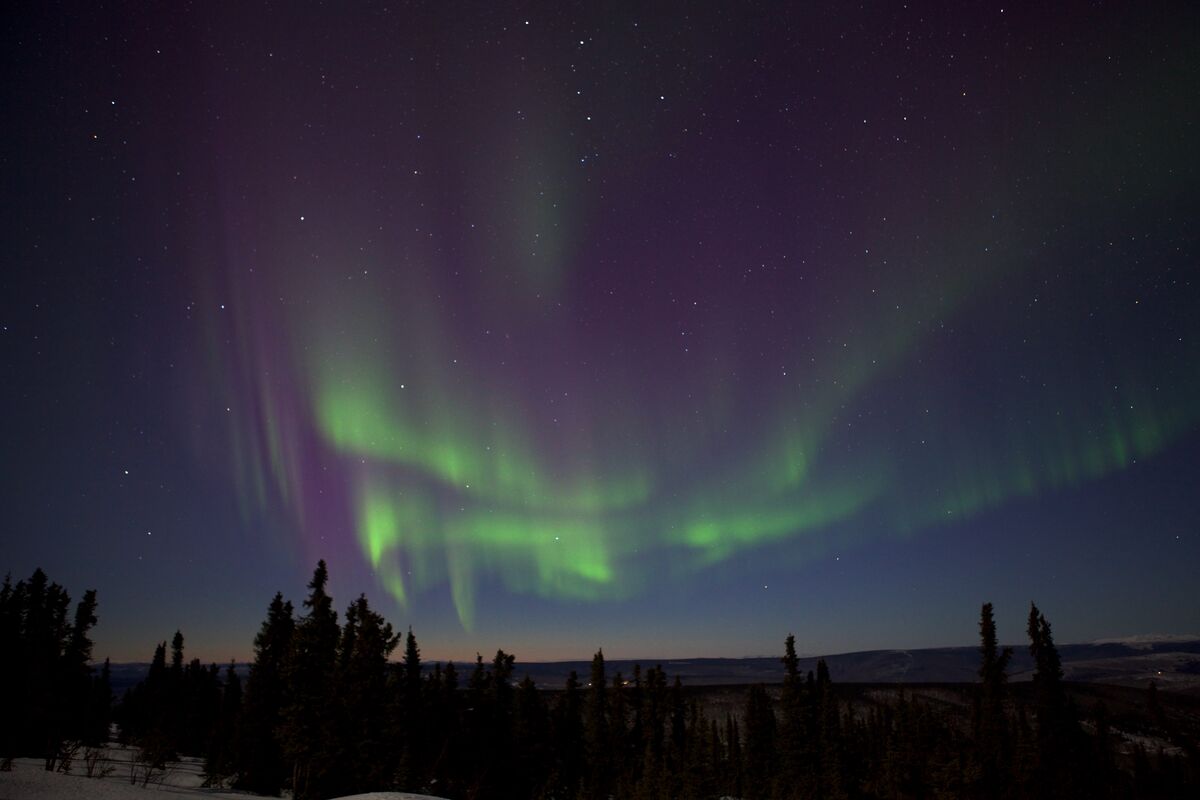Help with camera settings
Aug 29, 2023 09:08:13 #
I will be traveling to Iceland in December and look forward to seeing the Aurora Borealis. If you have successfully taken pictures, I would appreciate knowing the settings you used. Thank you
Aug 29, 2023 09:14:30 #
You should be able to experiment in real time and get some good settings. I have gotten good photos of the Aurora with color film 50 years ago and current sensors are more sensitive so just try something. If you're under the Auroral Oval it gets pretty bright and you should be able to get shots with less than 1 second shutter speeds. Aurorae are above 85 KM altitude so DOF should not be an issue unless you're trying to get nearby objects in the shot.
You can read a newspaper by the light of a bright aurora.
Note that aurora are dynamic so there will be motion.
You can read a newspaper by the light of a bright aurora.
Note that aurora are dynamic so there will be motion.
Aug 29, 2023 09:27:44 #
Do an online research on camera settings for photography of the Aurora Borealis....
Aug 29, 2023 09:45:30 #
JimNC wrote:
I will be traveling to Iceland in December and look forward to seeing the Aurora Borealis. If you have successfully taken pictures, I would appreciate knowing the settings you used. Thank you
Best way: experiment when you see them. The light is different for each occurrence.
I used a 50mm wide open, for seconds...
A tripod is a must.
(Don't expect to see what is usually shown in Nat Geo.)
Aug 29, 2023 11:23:40 #
I have not done it, but these links have been recommended to me by friends who have done it. The info may be somewhat repetitive, so I suggest you look at them in order of posting.
One tip that may or not be mentioned: your camera and lens may record more than what your eye (and brain) may be seeing so if in doubt, shoot some images. There may be more to see than what you first saw.
https://photographylife.com/how-to-photograph-the-aurora-borealis
https://digital-photography-school.com/how-to-photograph-the-northern-lights-or-aurora-borealis/
https://www.nikonusa.com/en/learn-and-explore/a/tips-and-techniques/awesome-skies-tips-and-techniques-for-photographing-the-northern-lights.html
https://www.photopills.com/videos/night-sky-photography-class-rachel-jones-ross
https://www.bhphotovideo.com/explora/photography/tips-and-solutions/8-tips-for-photographing-the-northern-lights-from-rachel-ross
https://www.youtube.com/watch?v=ykNYEh1V1sI
https://www.youtube.com/watch?v=xH2Mx4F6Srg
One tip that may or not be mentioned: your camera and lens may record more than what your eye (and brain) may be seeing so if in doubt, shoot some images. There may be more to see than what you first saw.
https://photographylife.com/how-to-photograph-the-aurora-borealis
https://digital-photography-school.com/how-to-photograph-the-northern-lights-or-aurora-borealis/
https://www.nikonusa.com/en/learn-and-explore/a/tips-and-techniques/awesome-skies-tips-and-techniques-for-photographing-the-northern-lights.html
https://www.photopills.com/videos/night-sky-photography-class-rachel-jones-ross
https://www.bhphotovideo.com/explora/photography/tips-and-solutions/8-tips-for-photographing-the-northern-lights-from-rachel-ross
https://www.youtube.com/watch?v=ykNYEh1V1sI
https://www.youtube.com/watch?v=xH2Mx4F6Srg
Aug 29, 2023 11:32:09 #
JimNC wrote:
I will be traveling to Iceland in December and look forward to seeing the Aurora Borealis. If you have successfully taken pictures, I would appreciate knowing the settings you used. Thank you
I have successfully photographed the aurora in several places. My advice is try to get the settings approximately set before you go outside since it will likely be quite cold. First, it will depend (as others said) on the strength of the aurora. Also it will depend on both your camera and lens. Do you have a wide lens with a good aperture (ie. f/2.8 or faster)? You should set the lens distance ahead of time for infinity and then fix it (ie. prefocus at infinity when there is light and tape the focus on manual at that distance). You want to use an ISO that on your camera doesn't give that much noise (I used 2,500) and the shutter speed at 8 or 10 seconds (to long will result in blur since as was mentioned the aurora will move). So set these as a starting point (and don't use a variable ISO setting). The settings for my pics are shown on Flickr in my Aurora album for each pic:
https://www.flickr.com/photos/60519499@N00/albums/72157718786455688
You can also read one of the excellent eBooks on photographing the aurora:
https://www.expeditionsalaska.com/downloads/photographers-guide-shooting-aurora-borealis-free-ebook/
https://www.alaskaphotographics.com/products/alaska-books-ebooks/how-to-photograph-the-northern-lights-ebook/
Aug 29, 2023 13:16:53 #
JimNC wrote:
I will be traveling to Iceland in December and look forward to seeing the Aurora Borealis. If you have successfully taken pictures, I would appreciate knowing the settings you used. Thank you
Camera?
Aug 30, 2023 01:19:48 #
No quick answer. It's really dependent on how much noise you can accept from your camera. And the settings will be different than you use to shoot the Milky Way. My data from Iceland last October:
5 seconds at F4 (EF11-24 with RF adapter) and ISO 1250 on my Canon R5
and 1 second at F2.8 (RF15-35) ISO 8000 on my Canon R3
For me, I prefer shorter exposure times so that the Northern Lights are not mushy and you can see the structure in them. 5 seconds is max for me. Both lenses are sharp wide open, so I adjust the ISO to whatever level is needed for a properly exposed image when used wide open, then deal with noise in post processing. The R3 handles noise better than the R5 so that's why the higher ISO and shorter exposure time on it.
For those traveling with me, I suggest practicing some night work before they go, quarter to half moon images, to make sure you can get sharp nighttime star images using manual focus (a must for the Northern Lights). They can also check to see how much noise their camera has at higher ISOs and if it can be acceptably dealt with in post.
Good luck in December. There's a lot of nighttime then. Dress warm...
5 seconds at F4 (EF11-24 with RF adapter) and ISO 1250 on my Canon R5
and 1 second at F2.8 (RF15-35) ISO 8000 on my Canon R3
For me, I prefer shorter exposure times so that the Northern Lights are not mushy and you can see the structure in them. 5 seconds is max for me. Both lenses are sharp wide open, so I adjust the ISO to whatever level is needed for a properly exposed image when used wide open, then deal with noise in post processing. The R3 handles noise better than the R5 so that's why the higher ISO and shorter exposure time on it.
For those traveling with me, I suggest practicing some night work before they go, quarter to half moon images, to make sure you can get sharp nighttime star images using manual focus (a must for the Northern Lights). They can also check to see how much noise their camera has at higher ISOs and if it can be acceptably dealt with in post.
Good luck in December. There's a lot of nighttime then. Dress warm...
Aug 30, 2023 06:42:46 #
billnikon
Loc: Pennsylvania/Ohio/Florida/Maui/Oregon/Vermont
JimNC wrote:
I will be traveling to Iceland in December and look forward to seeing the Aurora Borealis. If you have successfully taken pictures, I would appreciate knowing the settings you used. Thank you
If you want to photograph the Northern Lights, a good starting point is: aperture f/2.8 or the widest possible in your lens, ISO 3200-8000, and a shutter speed between 1-12 seconds, depending on the Northern Lights activity. The quicker the Aurora moves, the faster your shutter speed should be.
Aug 30, 2023 09:11:10 #
You are basically still shooting in a low light situation...act accordingly...not that different.
Shooting video...way easier.
Shooting video...way easier.
Aug 30, 2023 09:35:32 #
You probably want to shoot manually, otherwise your camera may take exposure information from either a bright or dark region of the sky. And, of course, autofocus off.
Aug 30, 2023 10:03:15 #
I went to Alaska - north of Fairbanks just for the Northern Lights. Here are the settings and lenses and camera I used mostly. Canon 5DII, EF24-70mm f2.8 lens, Rokinon 14mm f2.8. Don't forget your tripod. The image below was taken at ISO 1000, 24mm f2.8, 10sec exposure. I like the long exposures, you can see the movement of the Aurora.
Aug 30, 2023 10:13:08 #
I was in Iceland last March and shot many at F1.8, 2 seconds, and up to ISO 1600. Had no issues with noise. Sacrifice ISO for shutter speed to freeze the action. Any moon at all will light up the snow covered landscape.
Go to at least one ice cave while you are there and for sure go to Vestrahorn for a sunrise and even Aurora at night.
Dave
Go to at least one ice cave while you are there and for sure go to Vestrahorn for a sunrise and even Aurora at night.
Dave
If you want to reply, then register here. Registration is free and your account is created instantly, so you can post right away.






